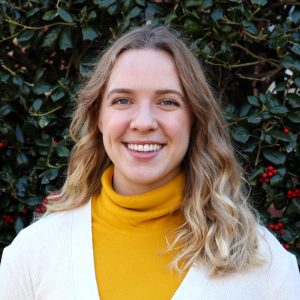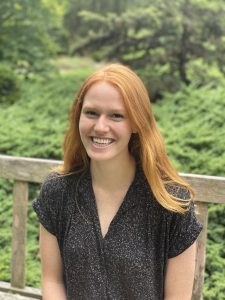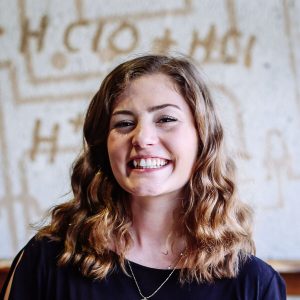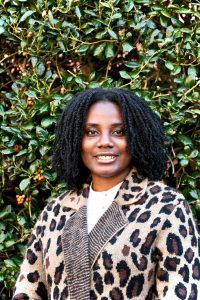Three Gillings students named 2024 Community Engagement Fellows
May 17, 2024
The Community Engagement Fellowship program at UNC-Chapel Hill awards a maximum of eight fellowships of up to $2,500 each year for engaged scholarship projects that are responsive to community priorities and have an academic connection. This year, three students of the UNC Gillings School of Global Public Health were chosen as fellows.
They will work in collaboration with community partners and faculty mentors from March through November 2024. Their project overviews are below:
Shifting power through communication: Bi-directional conversation guides for patients and clinicians

Elizabeth Anne Finnessy

Mary Kelly McHugh
Mary Kelly McHugh, who studies in the Department of Health Behavior at the Gillings School, and Elizabeth Anne Finnessy, a student in the School of Nursing, will work in partnership with Jennifer Medearis-Costello, MS, and the ACHIEVE Community Coalition. Their faculty adviser is Alexandra Lightfoot, EdD, associate professor of health behavior at Gillings.
Project Overview: ACHIEVE (Advancing Community and clinical care for childbirth related Hypertension through Implementation, Engagement and Valuing Equity) is a study funded by the National Heart, Lung, and Blood Institute that will use community engagement and implementation science approaches to address inequitable identification and response to hypertensive disorders of pregnancy (HDP) in outpatient settings. The ACHIEVE community engagement team partners with a community coalition, patients and providers to tailor evidence-based guidelines to several North Carolina clinical sites’ unique environments.
In an earlier phase of the project, the students engaged with partners to conduct a needs assessment and patient workshops. These processes were used to identify community assets, needs and priorities related to HDP. Through this engagement, ACHIEVE’s partners raised a need for resources to guide both providers’ respectful communication about the urgent health situation of HDP, and patients’ communication to providers about oft-dismissed symptoms. Ultimately, systemic change is needed to address the root causes of inequities around HDP. However, bi-directional communication guides could serve as a first step in shifting power to patients.
The fellows will use a human-centered design approach in the development of these guides and will undertake a thorough piloting with partners once prototypes have been developed.
Using photovoice to explore perceptions of water and sanitation in the AL Black Belt
Sherpa Community Engagement Fellowship

Olivia Harmon
Olivia Harmon, a student in the Gillings School’s Department of Environmental Sciences and Engineering, will partner with Emily McGlohn of the Rural Studio at Auburn University. Her faculty adviser is Joe Brown, PhD, PE, Gillings professor of environmental sciences and engineering.
Project Overview: Alabama’s Black Belt is characterized by a rich cultural heritage and is known as the birthplace of the Civil Rights movement in the United States. However, the region has recently gained national attention for failing or nonexistent wastewater infrastructure outside cities served by conventional sewerage, which lead to the Department of Justice’s first environmental justice investigation under Title VI of the Civil Rights Act of 1964. The investigation concluded with the citing of two areas of concern: 1) the use of fines and law enforcement to punish people with inadequate wastewater treatment systems, and 2) inadequate action to assess and address health risks from raw sewage.
In response to this sanitation crisis in the rural south, Harmon will examine the effects of an ongoing infrastructure project in Newbern, Alabama, located in the Black Belt region. Specifically, her research will assess the effects the sanitation intervention is having on environmental contamination, public health risk and individual well-being. As part of her overall approach, she will conduct a qualitative analysis using photovoice to capture residents’ perceptions of sanitation deficits prior to the installation of new sanitation infrastructure.
HealthEdu — Bridging health care gaps for international students in North Carolina

Oluwabusolami Ale
Oluwabusolami Ale, a student in the Department of Health Policy and Management, will collaborate with the UNC-Chapel Hill International Student Organization. Her adviser is Lori A. Evarts, MPH, PMP, CPH, MBTI, associate professor of public health leadership at the Gillings School.
Project Overview: Moving to a new country with a different culture can be a highly stressful experience for international students. The transition is marked by both excitement and great uncertainty. Many students travel alone and move far away from loved ones, and some undergo health-related changes both physical and mental. Unfortunately, many self-manage the symptoms they experience and are reluctant to visit the hospital or seek help due to the fear of incurring medical bills or a lack of understanding of available health care options.
International students at UNC-Chapel Hill are required to purchase an insurance plan every semester; however, many see it as just one of the bills they need to pay and do not understand how to utilize it because the U.S. system of health care is extremely different from the one in their home country. The primary objective of this project is to promote a culture of proactive health care-seeking behavior among international students on the Chapel Hill campus.
Read about the projects of all 2024 Community Engagement Fellows at the CCPS website.
Contact the UNC Gillings School of Global Public Health communications team at sphcomm@unc.edu.
